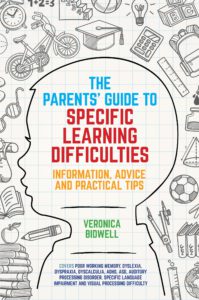 Packed full of advice and practical strategies for parents and educators, this book is a one-stop-shop for supporting children with Specific Learning Difficulties (SpLDs). We talked to Veronica about how she came to write the book, about her long experience as an Educational Psychologist, and what advice she has for parents whose child has an SpLD.
Packed full of advice and practical strategies for parents and educators, this book is a one-stop-shop for supporting children with Specific Learning Difficulties (SpLDs). We talked to Veronica about how she came to write the book, about her long experience as an Educational Psychologist, and what advice she has for parents whose child has an SpLD.
What inspired you to write this book?
I always wanted a book that I could give to parents which they could use for reference. I wanted a book that would explain the various learning difficulty labels, and one that would provide advice and support. It has been difficult to find such a book, so I decided to write it myself.
For most parents it can be really daunting to find that their child has a Specific Learning Difficulty (SpLD) and that they will need to roll up their sleeves and get to work. Unlike teachers and other educational professionals, parents have had no training. It can be hard for them to know where to start.
Parents need guidance. My hope is that this book will be of help. I hope it will provide encouragement and that the stories included will inspire optimism.
Why did you think it was important to cover such a wide range of difficulties?
We talk about dyslexia, dyspraxia, ADHD, dyscalculia etc. as separate conditions. But many of these conditions can exist together. Some children seem to have a bit of this and a bit of that, and no two children are identical.
My aim in writing this book has been to cover a wide canvas that will give parents the information they need to understand their unique child and to decide how best to support and help them. It helps to look at the bigger picture to ensure that any diagnosis is correct and that the most appropriate help is put in place.
What advice would you give to parents whose child has recently been “diagnosed” with a Specific Learning Difficulty?
Do not panic but do take it seriously. The problem will not evaporate overnight. Learn all you can about your child’s condition. Plan appropriate help and make sure that it can be fitted into family life in a sustainable way.
You will need to talk with your child’s teachers and the school’s special needs coordinator. Find out what help school can provide and make sure that progress is regularly reviewed. Aim to work in partnership with school staff.
It’s important to think about how you can make sure that your child remains confident and happy; they should still have plenty of opportunity to do the things which they are good at and enjoy. Try and see the world through their eyes and do remember to never discuss your child with others in their hearing.
Read this book!
How is this book helpful for teachers?
The book outlines the problems that children with different Specific Learning Difficulties are likely to experience in the classroom, and provides pointers for the correct identification of an SpLD. If a teacher is already aware that one of the children in their class has a difficulty, the relevant chapter of the book will provide suggestions for helping and teaching. Kind and sympathetic teachers can make an incredible difference.
Tell us about your background. How did you become an educational psychologist?
My career as an educational psychologist started once my four children were in school. First came a Psychology degree, then post grad teacher training, a period of teaching and of course a masters degree in educational psychology. I have loved every minute of it!
During the time that I was qualifying it became apparent that my youngest son had difficulty with literacy. He was was identified as being dyslexic. His difficulties were at the more serious end of the spectrum and in addition his attention and concentration were poor.
This firsthand experience of the highs and lows of parenting a wonderful but non traditional learner means that I have been able to appreciate and empathise with parental anxiety and concerns.
Click here to find out more about The Parents’ Guide to Specific Learning Difficulties.